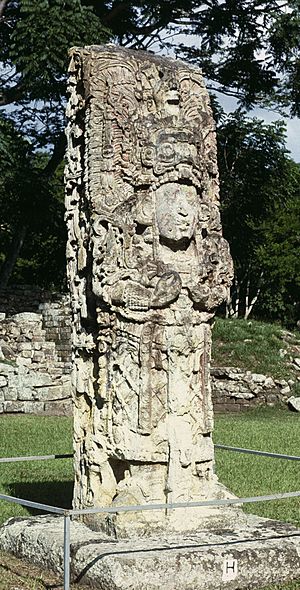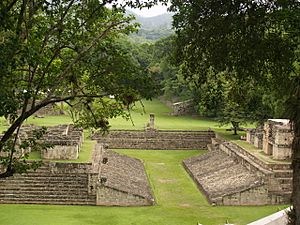Uaxaclajuun Ubʼaah Kʼawiil facts for kids
Quick facts for kids Uaxaclajuun Ubʼaah Kʼawiil |
|
|---|---|
| Ajaw | |

Uaxaclajuun Ubʼaah Kʼawiil's portrait on Stela H
|
|
| King of Copán | |
| Reign | 9 July 695 - 3 May 738 |
| Predecessor | Chan Imix Kʼawiil |
| Successor | Kʼakʼ Joplaj Chan Kʼawiil |
| Born | 675 Copán |
| Died | 3 May 738 (aged 62–63) Quiriguá |
| Issue | Kʼakʼ Joplaj Chan Kʼawiil |
| Father | Chan Imix Kʼawiil |
| Religion | Maya religion |
Uaxaclajuun Ubʼaah Kʼawiil was a powerful Maya ruler. He was the 13th king, or ajaw, of the ancient city of Copán. Copán was a major city in what is now Honduras.
He is also known by the nickname "Eighteen Rabbit". Uaxaclajuun Ubʼaah Kʼawiil ruled Copán for many years. His reign lasted from January 2, 695, to May 3, 738. During his time, Copán became famous for its amazing art and buildings.
Contents
History of a Maya King
Uaxaclajuun Ubʼaah Kʼawiil became king of Copán in 695. He took the throne after the death of the previous ruler, Smoke Imix. His first big project was building the Esmeralda Structure. This was a special building to bury Smoke Imix.
He also built a famous stairway covered in hieroglyphs. This stairway was on the east side of the Esmeralda Structure. It was a way to remember important events from his reign.
Amazing Maya Architecture
Uaxaclajuun Ubʼaah Kʼawiil was a great supporter of the arts. Many buildings and monuments were built during his rule. This time was known for its detailed and beautiful sculptures. These sculptures showed the best of Copán's art style.
The Sacred Mountain Temple
One of the most impressive buildings from his time was Structure 10L-22. This building was designed to look like a sacred man-made mountain. Inside, there was a special room. It was likely used for important Maya rituals.
The corners of this structure had stone masks. These masks were called 'stone mountain' in the ancient texts. The entrance looked like a giant arching monster. It was meant to represent the mouth of a cave. This was a symbolic way to enter the earth.
The Grand Ballcourt
Uaxaclajuun Ubʼaah Kʼawiil's last big building project was Ballcourt A-III. This was a huge Mesoamerican ballcourt. It was one of the largest in the region. Only the ballcourt at Chichen Itza was bigger.
This ballcourt had special sloping benches for the players. It also had six macaw bird markers. Macaws usually represent the sun. But these macaws had a sign for darkness on their tails. This might mean they stood for the sun in the Underworld. The game played here could have been a symbolic fight between light and dark.
The benches of the ballcourt had hieroglyphic writings. One of these writings showed the date it was finished. It was dedicated in 738. This was only 113 days before Uaxaclajuun Ubʼaah Kʼawiil passed away.
Incredible Maya Sculpture
Between 711 and 736, Uaxaclajuun Ubʼaah Kʼawiil ordered seven large stone monuments. These are called stelas. Stelas C, F, 4, H, A, B, and D were built during this time. They are considered some of the best examples of Classic Maya sculpture.
Each stela shows Uaxaclajuun Ubʼaah Kʼawiil in a special ritual pose. He holds a two-headed centipede bar against his chest. One stela, Stela A, says that Copán was one of the four greatest Maya kingdoms. The others were Calakmul, Palenque, and Tikal.
His Final Days
Uaxaclajuun Ubʼaah Kʼawiil's reign ended in 738. He was captured and defeated by the ruler of a smaller city called Quiriguá. This was a big surprise because Copán was much larger and more powerful.
What Happened Next
The defeat of Uaxaclajuun Ubʼaah Kʼawiil had a huge impact on Copán. After a time of amazing building and art, no new structures were built for 18 years. Kʼakʼ Joplaj Chan Kʼawiil became the next ruler of Copán. However, he was likely under the control of Quiriguá's king.
The loss of trade routes from Quiriguá was a big problem for Copán. It caused economic and political difficulties for the city.
Images for kids
See also
 In Spanish: Uaxaclajuun Ub'aah K'awiil para niños
In Spanish: Uaxaclajuun Ub'aah K'awiil para niños



